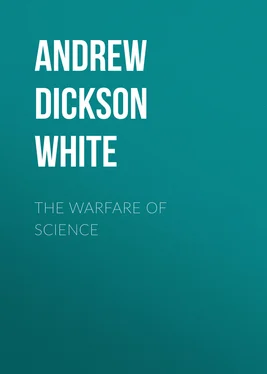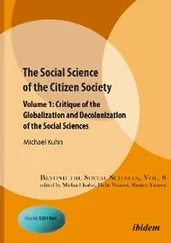Andrew Dickson White - The Warfare of Science
Здесь есть возможность читать онлайн «Andrew Dickson White - The Warfare of Science» — ознакомительный отрывок электронной книги совершенно бесплатно, а после прочтения отрывка купить полную версию. В некоторых случаях можно слушать аудио, скачать через торрент в формате fb2 и присутствует краткое содержание. Жанр: foreign_prose, foreign_religion, Философия, foreign_psychology, foreign_antique, на английском языке. Описание произведения, (предисловие) а так же отзывы посетителей доступны на портале библиотеки ЛибКат.
- Название:The Warfare of Science
- Автор:
- Жанр:
- Год:неизвестен
- ISBN:нет данных
- Рейтинг книги:5 / 5. Голосов: 1
-
Избранное:Добавить в избранное
- Отзывы:
-
Ваша оценка:
- 100
- 1
- 2
- 3
- 4
- 5
The Warfare of Science: краткое содержание, описание и аннотация
Предлагаем к чтению аннотацию, описание, краткое содержание или предисловие (зависит от того, что написал сам автор книги «The Warfare of Science»). Если вы не нашли необходимую информацию о книге — напишите в комментариях, мы постараемся отыскать её.
The Warfare of Science — читать онлайн ознакомительный отрывок
Ниже представлен текст книги, разбитый по страницам. Система сохранения места последней прочитанной страницы, позволяет с удобством читать онлайн бесплатно книгу «The Warfare of Science», без необходимости каждый раз заново искать на чём Вы остановились. Поставьте закладку, и сможете в любой момент перейти на страницу, на которой закончили чтение.
Интервал:
Закладка:
Andrew Dickson White
The Warfare of Science
PREFATORY NOTE
In its earlier abridged form this address was given as a Phi Beta Kappa oration at Brown University, and, as a lecture, at New York, Boston, New Haven, Ann Arbor, and elsewhere. In that form, substantially, it was published in The Popular Science Monthly. I have now given it careful revision, correcting some errors, and extending it largely by presenting new facts and developing various points of interest in the general discussion. Among the subjects added or rewrought are: in Astronomy, the struggle of Galileo and the retreat of the Church after its victory; in Chemistry and Physics, the compromise between Science and Theology made by Thomas Aquinas, and the unfortunate route taken by Science in consequence; in Anatomy and Medicine, the earlier growth of ecclesiastical distrust of these sciences; in Scientific Education, the dealings of various European universities with scientific studies; in Political and Social Science, a more complete statement of the opposition of the Church, on Scriptural grounds, to the taking of interest for money; and, in the conclusion, a more careful summing up. If I have seemed to encumber the text with notes, it has been in the intention to leave no important assertion unsupported; and in the hope that others—less engrossed with administrative care than myself—may find in them indications for more extended studies in various parts of the struggle which I have but sketched.
A. D. W.Cornell University, March, 1876 .
THE WARFARE OF SCIENCE
I purpose to present an outline of the great, sacred struggle for the liberty of science—a struggle which has lasted for so many centuries, and which yet continues. A hard contest it has been; a war waged longer, with battles fiercer, with sieges more persistent, with strategy more shrewd than in any of the comparatively transient warfare of Cæsar or Napoleon or Moltke.
I shall ask you to go with me through some of the most protracted sieges, and over some of the hardest-fought battle-fields of this war. We will look well at the combatants; we will listen to the battle-cries; we will note the strategy of leaders, the cut and thrust of champions, the weight of missiles, the temper of weapons; we will look also at the truces and treaties, and note the delusive impotency of all compromises in which the warriors for scientific truth have consented to receive direction or bias from the best of men uninspired by the scientific spirit, or unfamiliar with scientific methods.
My thesis, which, by an historical study of this warfare, I expect to develop, is the following: In all modern history, interference with science in the supposed interest of religion, no matter how conscientious such interference may have been, has resulted in the direst evils both to religion and to science—and invariably. And, on the other hand, all untrammeled scientific investigation, no matter how dangerous to religion some of its stages may have seemed, for the time, to be, has invariably resulted in the highest good of religion and of science. I say "invariably." I mean exactly that. It is a rule to which history shows not one exception.
It would seem, logically, that this statement cannot be gainsaid. God's truths must agree, whether discovered by looking within upon the soul, or without upon the world. A truth written upon the human heart to-day, in its full play of emotions or passions, cannot be at any real variance even with a truth written upon a fossil whose poor life ebbed forth millions of years ago.
This being so, it would also seem a truth irrefragable, that the search for each of these kinds of truth must be followed out on its own lines, by its own methods, to its own results, without any interference from investigators on other lines, or by other methods. And it would also seem logical to work on in absolute confidence that whatever, at any moment, may seem to be the relative positions of the two different bands of workers, they must at last come together, for Truth is one.
But logic is not history. History is full of interferences which have cost the earth dear. Strangest of all, some of the direst of them have been made by the best of men, actuated by the purest motives, and seeking the noblest results. These interferences, and the struggle against them, make up the warfare of science.
One statement more, to clear the ground. You will not understand me at all to say that religion has done nothing for science. It has done much for it. The work of Christianity has been mighty indeed. Through these two thousand years, despite the waste of its energies on all the things its Blessed Founder most earnestly condemned—on fetich and subtlety and war and pomp—it has undermined servitude, mitigated tyranny, given hope to the hopeless, comfort to the afflicted, light to the blind, bread to the starving, joy to the dying, and this work continues. And its work for science, too, has been great. It has fostered science often. Nay, it has nourished that feeling of self-sacrifice for human good, which has nerved some of the bravest men for these battles.
Unfortunately, a devoted army of good men started centuries ago with the idea that independent scientific investigation is unsafe—that theology must intervene to superintend its methods, and the Biblical record, as an historical compendium and scientific treatise, be taken as a standard to determine its results. So began this great modern war.
GEOGRAPHY
The first typical battle-field to which I would refer is that of Geography—the simplest elementary doctrine of the earth's shape and surface.
Among the legacies of thought left by the ancient world to the modern, were certain ideas of the rotundity of the earth. These ideas were vague; they were mixed with absurdities; but they were germ ideas , and, after the barbarian storm which ushered in the modern world had begun to clear away, these germ ideas began to bud and bloom in the minds of a few thinking men, and these men hazarded the suggestion that the earth is round—is a globe. 1 1 Most fruitful among these were those given by Plato in the Timæus . See, also, Grote on Plato's doctrine of the rotundity of the earth. Also Sir G. C. Lewis's Astronomy of the Ancients , London, 1862, chap. iii., sec. i. and note. Cicero's mention of the antipodes and reference to the passage in the Timæus are even more remarkable than the original, in that they much more clearly foreshadow the modern doctrine. See Academic Questions , ii., xxxix. Also, Tusc. Quest. , i., xxviii., and v., xxiv.
The greatest and most earnest men of the time took fright at once. To them, the idea of the earth's rotundity seemed fraught with dangers to Scripture: by which, of course, they meant their interpretation of Scripture.
Among the first who took up arms against the new thinkers was Eusebius. He endeavored to turn off these ideas by bringing science into contempt, and by making the innovators understand that he and the fathers of the Church despised all such inquiries. Speaking of the innovations in physical science, he said: "It is not through ignorance of the things admired by them, but through contempt of their useless labor, that we think little of these matters, turning our souls to better things." 2 2 See Eusebius , Præp. Ev. , xv., 61.
Интервал:
Закладка:
Похожие книги на «The Warfare of Science»
Представляем Вашему вниманию похожие книги на «The Warfare of Science» списком для выбора. Мы отобрали схожую по названию и смыслу литературу в надежде предоставить читателям больше вариантов отыскать новые, интересные, ещё непрочитанные произведения.
Обсуждение, отзывы о книге «The Warfare of Science» и просто собственные мнения читателей. Оставьте ваши комментарии, напишите, что Вы думаете о произведении, его смысле или главных героях. Укажите что конкретно понравилось, а что нет, и почему Вы так считаете.












